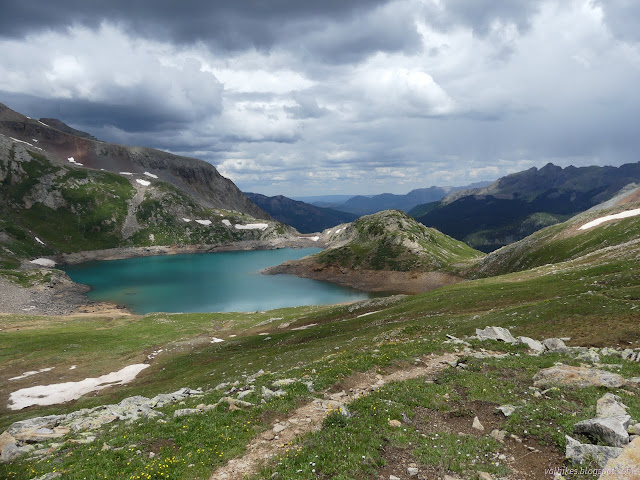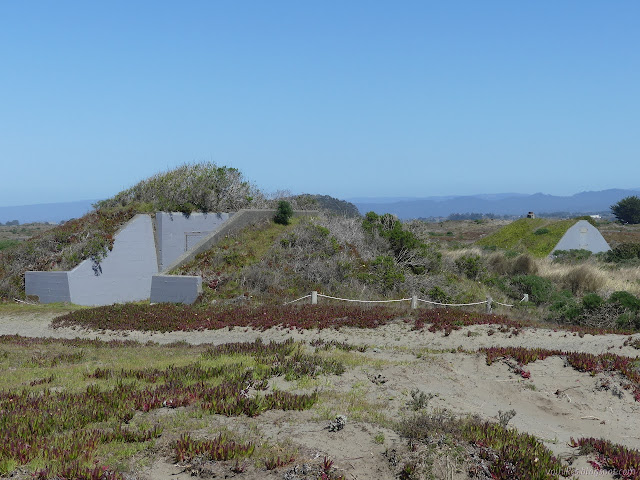hope: Iron Mountain gold mines
Angeles National Forest
There are all sorts of known gold mines, and likely as many unknown ones, around the local counties. This is gold country, after all. Iron Mountain must have been a very attractive place to mine because it is riddled with the things even though it is (and was) a remote and difficult area. One still finds prospectors when going up the East Fork of the San Gabriel River at the bottom of the mountain. A lot can be found out about these mines from the local enthusiasts. Many of the mines around Iron Mountain are included in the "mines we will never see" section. There is also a section of lost mines of Iron Mountain.Some of the mines in the area are:
- Allison Mine, which may have two almost usable routes to it, one up the gulch from the "bridge to nowhere" trail and one along the hillside from the maintained part of the trail out of Heaton Flat
- Baldora Mine, sometimes claimed to be another name for Widco, but at least one excursion reports that there are two distinct mines in the area
- Big Horn Mine, which is about 2.5 miles south from Vincent Gap by an old wagon trail, meeting the trail to Vincent Gulch near the lot
- Eagle Mine, up above Coldwater Canyon from the trail from Heaton Flat
- Gold Dollar Mine, up above Coldwater Canyon
- Jumbo Channel Placer Mine, on up Mine Gulch
- Horseshoe Mine, just a little ways below the bridge
- Native Son Mine, which is a bit northwest of everything and has an old road (Blue Ridge, not maintained for low clearance vehicles) near it
- Queenie Mine, which I'm not certain where is, might be on the road up to Heaton Flat
- Stanley-Miller mine, up in "the Narrows" of East Fork, reported to be a "must see" bit of the canyon, one tunnel used to have an ore cart still in it
- Widco Mine, up above Coldwater Canyon
- Mount San Antonio updated 1988
- Crystal Lake updated 1972
- Mount Baldy updated 1988
- Glendora updated 1972
Mileages are measured by string so can be up to 20% short, but are probably not more than 10% short.
About 2.5 day trip for Widco, Baldora, Eagle, and Gold Dollar:
Heading out from Heaton Flat, it is about 4.6 mi (2500 ft gained) to a saddle. This is a junction with the old Allison Mine trail, a use trail to the top of Iron Mountain, and the trail down to the Coldwater Canyon which should be the biggest. Another 2.9 mi (500 ft lost) to where the trail (which is turns to old road about halfway along) turns back downstream and continues to a ranch. Where the road makes the turn is the start of the trails that have been removed from the new maps. It is 0.8 mi (540 ft up) to some buildings that are part of Widco Mine. The shafts and workings are up the side of the canyon a fair bit, the trail followed the bottom of the gulch, so likely indistinguishable from no trail. 0.2 mi further up the gulch is Baldora with some more workings.It looks like the easiest way up to Gold Dollar would actually be to follow this gulch further up and follow along spots where the contours aren't too close together until maybe even finding the old trail except for two things. One is that this is called "Dry Gulch", so there might actually be no water and it will be about time to camp when the mines are found. Another is this trip description by Prof. Brennen which has a secondary escape route that includes finding the Gold Dollar mine workings and says it is important to find the old trail. Otherwise, it would be about 1.5 mi, maybe a touch more for switchbacking up the slopes, and 2000 ft to get to Gold Dollar.
Instead, after poking around the mine workings, should head back down the gulch to near the road again, so lose that 540 ft. Head up Coldwater Canyon a mile or so to get around a big bend where the canyon starts to get steeper and find a camping spot, about 0.9 mile (320 ft up).
Next day, the rest of the way up Coldwater Canyon and try to find the trail up from there to the two mines. From the junction in Coldwater Canyon to the junction between trails to mines is 2.2 mi (2500 ft up total). It's another 0.45 mile (200 ft up) to Eagle Mine, and back down, then 1.3 (1200 ft up) to Gold Dollar. Then back to Coldwater Canyon for another night.
Hike out the following morning. The first day might be a little long.
About 4 day trip adding Allison:
At the saddle junction while hiking out, turn down the old trail to Allison Mine. The mine should have water and is thus a good camping spot. About 6 mi (fairly flat, not measured by me) along that trail.Next day, head down the old trail along the side into the gulch a mile or so below Allison Mine. You can't head down the gulch because there are waterfalls. There's probably enough time to go up to the lowest one from below once down in the gulch. Proceed down to the mouth of the gulch, right at the 3 mile mark for the bridge trail, and plunge into the river just to cross right back. Welcome to East Fork. Now that the boots are soaked, there's a nice long section with no need to cross, then two more and a possible wading along the side before getting to the lot again.
About 5 day trip adding Stanley-Miller and Horseshoe Mine:
After getting to Allison, there is another trail directly to Stanley-Miller, take this. This may be even harder to find than the one to Allison from the saddle and is a little longer (ish, downhill... maybe). The mine is not a good camp (no water), but it isn't too far above the river which offers ample water.The next day, in the Narrows, legendary section of East Fork. Look around! There is an old camp up there (might be camping at it). Eventually start the wade down. Look for old bits of road to reduce river crossings. There will be a trail up to the "bridge to nowhere", which should make some of the travel easier. Below the bridge is Horseshoe Mine. Further below the bridge are 2 river crossings before getting to the mouth of Allison Gulch and those described in the hike out for Allison.
Other notes:
The longer the trip, the more chance for failure. This would be a really hard hike, don't be dead set on getting through the 5 day version and actually seeing all the mines and all the shafts that you can pick out from the hand drawn maps the mine enthusiasts have. If it gets too hard over the first days, it's just a matter of turning back, but heading off to Allison and Stanley-Miller is progressively more risky. This can't be done without good maps and good map skills.There's yucca up there. It seems to be called "sword bush" by folks who have tried the trail, and for good reason. It might not sound attractive with the possible heat, but jeans are your friend around yucca. Thick, thick jeans. Or maybe a machete. I'm not sure how effective they are on yucca. Some loppers might do the trick. Would certainly be a nice upper body workout.
Parking requires an Adventure Pass or Golden Passport or America the Beautiful, which is what they call the Golden Passport now.
Backcountry hiking and camping is dangerous, but this trip could be particularly dangerous. Also, people have reported mountain lions in the area.
Liked this? Interesting? Click the three bars at the top left for the menu to read more or subscribe!




Comments